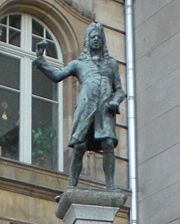
Johann Andreas Eisenbarth
Encyclopedia

Surgeon
In medicine, a surgeon is a specialist in surgery. Surgery is a broad category of invasive medical treatment that involves the cutting of a body, whether human or animal, for a specific reason such as the removal of diseased tissue or to repair a tear or breakage...
who was a native of Oberviechtach
Oberviechtach
Oberviechtach is a town in the district of Schwandorf, in Bavaria, Germany. It is situated 31 km southeast of Weiden in der Oberpfalz, and 27 km northeast of Schwandorf....
, Bavaria
Bavaria
Bavaria, formally the Free State of Bavaria is a state of Germany, located in the southeast of Germany. With an area of , it is the largest state by area, forming almost 20% of the total land area of Germany...
. Eisenbarth was an oculist and barber-surgeon who specialized in treatment of cataract
Cataract
A cataract is a clouding that develops in the crystalline lens of the eye or in its envelope, varying in degree from slight to complete opacity and obstructing the passage of light...
s, calculus
Calculus (medicine)
A calculus is a stone that forms in an organ or duct of the body. Formation of calculi is known as lithiasis...
surgery, and the treatment of bone fractures. His grandfather and father were also surgeons, and much of Eisenbarth's medical knowledge was learned from his brother-in-law. Although, he was referred to as "Dr. Eisenbarth", he had no medical doctorate, nor was he officially appointed to the title. Despite this, he was considered a skilled surgeon, and was bestowed with privileges by German royalty.
Eisenbarth was a "travelling surgeon", and his journeys took him throughout most of Germany. He usually travelled with a large entourage of up to 120 persons. This group included entertainers, harlequin
Harlequin
Harlequin or Arlecchino in Italian, Arlequin in French, and Arlequín in Spanish is the most popularly known of the zanni or comic servant characters from the Italian Commedia dell'arte and its descendant, the Harlequinade.-Origins:...
s and musicians who performed in a carnival-like atmosphere while Eisenbarth plied his trade. This spectacle drew large crowds, and the loud music and revelry helped drown out the cries of pain from his patients.
Eisenbarth designed his own medical instruments, including a cataract needle and a polypus hook. From his home in Magdeburg
Magdeburg
Magdeburg , is the largest city and the capital city of the Bundesland of Saxony-Anhalt, Germany. Magdeburg is situated on the Elbe River and was one of the most important medieval cities of Europe....
called Zum goldenen Apfel, he manufactured and marketed his own medicine, and sold these remedies on a large-scale. Around 1800 a song called Ich bin der Doktor Eisenbarth (My Name is Doctor Eisenbarth) became popular in Germany, and author Eike Pies penned a book titled Ich bin der Doktor Eisenbarth. In his home town of Oberviechtach, there is the "Eisenbarth Fountain", commemorating his work. Also, a pharmacy
Pharmacy
Pharmacy is the health profession that links the health sciences with the chemical sciences and it is charged with ensuring the safe and effective use of pharmaceutical drugs...
in Oberviechtach sells a product called "Eisenbarth elixir", and a 1977 German postage stamp
Postage stamp
A postage stamp is a small piece of paper that is purchased and displayed on an item of mail as evidence of payment of postage. Typically, stamps are made from special paper, with a national designation and denomination on the face, and a gum adhesive on the reverse side...
features his visage.

